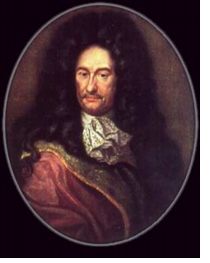 Leibnitz grew up in a pius Lutheran Christian family. His father died when Gottfried was 8 years old; he left a considerable library, which aided the child's education.
Leibnitz grew up in a pius Lutheran Christian family. His father died when Gottfried was 8 years old; he left a considerable library, which aided the child's education.Philosopher and mathematician, b. 1 July (21 June) 1646 (Leipzig, Germany), d. 14 November 1716 (Hannover).
 Leibnitz grew up in a pius Lutheran Christian family. His father died when Gottfried was 8 years old; he left a considerable library, which aided the child's education.
Leibnitz grew up in a pius Lutheran Christian family. His father died when Gottfried was 8 years old; he left a considerable library, which aided the child's education.
Leibnitz entered the University of Leipzig in 1661 to study law and completed his studies in 1666. His application to the degree of doctor of law was refused because of his age, and Leibnitz left his native city, never to return. He submitted a dissertation De Casibus Perplexis (On Perplexing Cases) to the University of Nürnberg in Altdorf, where he received the doctor's degree immediately and was offered a professorial appointment, which he declined.
Of all great philosphers of his time Leibnitz was the only one who had to procure a living through employment. He divided his time between three activities:
The years 1672 - 1676, when Leibnitz was without employment, were particularly fruitful. Leibnitz visited the Royal Society in London in 1673 and demonstrated a mechanical calculator that he had constructed. He developed the principles of differential and integral calculus in late 1675. (Newton, who had found the same principles independently, attacked Leibnitz ferociously but unjustly for plagiarism.) He introduced the concept of kinetic energy in 1676. In 1679 he perfected his system of binary calculations used in his calculating machine and developed the basics of what has become known in mathematics as general topology.
In 1684 Leibnitz found time to publish his differential calculus in Nova Methodus pro Maximis et Minimis (New Method for the Greatest and the Least), one of the fundamental works of modern mathematics.
After 1691, when Leibnitz held the position of librarian, he found time to write more articles for scientific journals. His philosophical work was mainly directed against Descartes' teaching that divides the world into mind (spirit and soul) and matter (body) and declared that the humans can achieve salvation through the mind by choosing good of their own free will. Leibnitz held that there exists an original harmony between body and soul and that God does not have to promote man's action through man's thoughts. He became acquainted with the philosopher Spinoza and reported that he "conversed with him often and at great length."
By the turn of the century Leibnitz' name was known all over Europe. The ruling houses of Europe asked for his services with advice and consultancy. Leibnitz proved himself always a patriot and true cosmopolitan. He was instrumental in the founding of the German Academy of Sciences in 1700 in Berlin. In the same year the Academy of Sciences in Paris made him a foreign member.